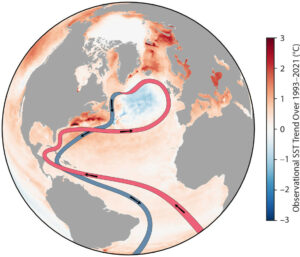May 2nd, 2025
Met Éireann climate scientists and fellow experts in ocean circulation from the Irish research community have requested more investment on focused research and a coordinated communication strategy in response to the risk of major changes in the Atlantic Meridional Overturning Circulation (AMOC).

Figure 1: A highly simplified schematic of the Atlantic Meridional Overturning Circulation (AMOC) against a backdrop of the sea surface temperature trend since 1993 from the Copernicus Climate Change Service. Image credit: Ruijian Gou.
A new policy briefing document issued by the Ryan Institute at the University of Galway, in collaboration with Met Éireann and Maynooth University, addresses the growing concern of a partial collapse of the AMOC, which impacts the transfer of heat responsible for Ireland’s mild climate.
The document outlines a series of concerns, research gaps and opportunities borne out of extensive research, leading with the expectation of more extreme weather events and enhanced seasonality, even in the case of a gradual AMOC decline.
Acknowledging the uncertainty around specific risks and impacts for Ireland, the authors call for urgent investment in further research to advance understanding of AMOC variability and quantify what the impacts of a potential collapse would be.
Alongside the investment in research, the document recommends a coordinated communication strategy for the benefit of all stakeholders, incorporating regular workshops and meetings, as well as a dedicated online portal through which new research can be presented in a citizen, media, and policy-friendly manner.
In their conclusion, the contributors suggest that by addressing the research gaps and capitalising on the opportunities available, the Irish research community can make significant contributions to the understanding of the AMOC and its implications for the global climate system.
Authored by Dr Audrey Morley from the University of Galway, and the Research Ireland Centre for Applied Geosciences (iCRAG), Dr Gerard McCarthy from Maynooth University, and Dr Enda O’Dea and Dr Tido Semmler from Met Éireann’s Climate Modelling unit, the document in full can be viewed here.
Read more about the evolution of the AMOC on met.ie.